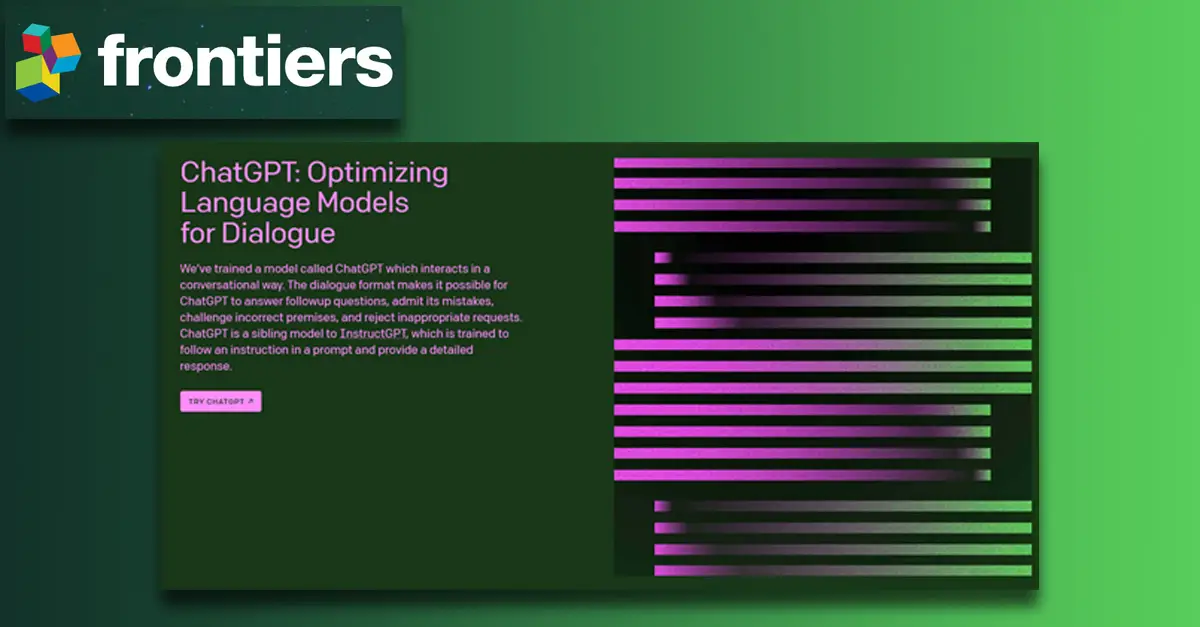A recent tweet by Mark A. Hanson posed the question “What is your opinion of Frontiers Media as a publisher?” The survey allowed one of four answers:
- Very reputable publisher
- Reputable publisher
- Quasi-predatory publisher
- Predatory publisher
The survey was posted on the 27 Jan 2023, and ran for (we believe) seven days.
Before showing you the results of the survey, we thought it would be an interesting exercise to see what ChaptGPT said about this publisher, just to see if there is any correlation between the Twitter survey and ChatGPT.
What is your opinion of Frontiers Media as a publisher?
This was the question that was asked in the twitter survey. We thought we would ask ChaptGPT the same question. The question was asked on 31 Jan 2023. The response from ChaptGPT was as follows.
“As a language model AI, I don’t have personal opinions or biases. However, Frontiers Media is a large open-access publisher that has been in operation for over a decade, and has published many high-quality research articles across a wide range of academic disciplines. Some researchers and academics consider it to be a reputable publisher, while others have raised concerns about its business model and the peer review process. Ultimately, the reputation of a publisher, including Frontiers Media, depends on the individual perception of the research community and the quality of the articles it publishes.“
We should note that this question was posed in a “new” ChatGPT. That is, ChaptGPT was not given access to its previous answers, so that it did not answer questions in the context of previous answers.
Is Frontiers Media a predatory publisher?
After starting a new chat, we posed the question above (31 Jan 2023). The response was as follows:
“Frontiers Media has received some criticism and allegations of being a predatory publisher, however, the company has denied these claims and states that it follows rigorous peer-review processes. The definition of a predatory publisher is still subject to debate and it’s important to consider multiple sources before making a conclusion.“
Would you have any advice for a researcher who is thinking of submitting a research paper to Frontiers Media?
Without starting a new chat, we posed the question above. ChatGPT responded as follows:
“Here are a few tips for a researcher considering submitting a research paper to Frontiers Media:
Check the reputation and publication standards of the specific journal within Frontiers Media you are considering submitting to, as the quality of journals can vary within the same publisher.
Look for information about the peer-review process, editorial board, and publication fees.
Check for any warnings or red flags on websites like ThinkCheckSubmit or Cabells blacklist.
Consider the impact factor and citations of the journal and previous articles published in the same journal.
Consult with your colleagues and mentors to see if they have any experience or insights on the journal.
Read the author guidelines carefully, including information on open-access publishing fees and copyright policies.
Make an informed decision based on your own research and professional judgement.“
What did the Twitter survey say?
After the Twitter survey had closed, we took a look at the results (see figure below).
We should note that the survey is a small sample size (42 responses) and the results must be read/interpreted in that context.
The figures in red and the actual number of responses, which we give in addition to the percentage figures that are reported.
Other information sources
We don’t often cite Wikipedia (for all the well-known reasons around not being peer reviewed, subject to change etc.) but it is a go-to place for many people so the Wikipedia Frontiers Media page might be worth a look, with all the caution that should be exercised when looking at this resource.
Kendall (2021) mentioned Frontiers in his paper on Beall’s legacy. That paper drew on Schneider (2017), which itself drew on Basken (2017). The presented evidence would suggest that Beall adding Frontiers Media to his list, ultimately led to him taking down his list.
For the interested reader, we would recommend that the above three papers are worth taking a look at. Frontiers Media has been subject to previous scrutiny and have always strongly defended their position.
Conclusion
It is interesting to see that the Twitter survey broadly agrees with the views given by ChatGPT. Of course, this all has to be taken with a pinch of salt. The survey sample is relatively small and could be biased in a number of ways (the audience that is likely to see it, the responses are anonymous so could be open to people who are conflicted taking part etc.).
The ChatGPT comments should also be treated with caution. Where ChaptGPT gets it information from is unknown, there are no references to support its views and ChaptGPT does not have information more recent that 2021.
Our advice: We cannot do better than ChaptGPT which says “Make an informed decision based on your own research and professional judgement.” It is important that, as researchers, we learn how to find journals and publishers that we are comfortable with. There is lots of information, advice and colleagues out there and it is beholden on us to draw on those resources, to decide which journals are deserving of our research.



